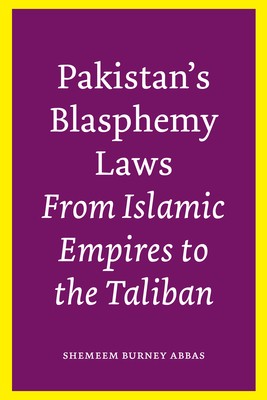
- We will send in 10–14 business days.
- Author: Shemeem Burney Abbas
- Publisher: University of Texas Press
- ISBN-10: 0292762127
- ISBN-13: 9780292762121
- Format: 15.2 x 22.9 x 1.3 cm, softcover
- Language: English
- SAVE -10% with code: EXTRA
Reviews
Description
Under the guise of Islamic law, the prophet Muhammad's Islam, and the Qur'an, states such as Pakistan, Afghanistan, Egypt, Saudi Arabia, and Bangladesh are using blasphemy laws to suppress freedom of speech. Yet the Prophet never tried or executed anyone for blasphemy, nor does the Qur'an authorize the practice. Asserting that blasphemy laws are neither Islamic nor Qur'anic, Shemeem Burney Abbas traces the evolution of these laws from the Islamic empires that followed the death of the Prophet Muhammad to the present-day Taliban. Her pathfinding study on the shari'a and gender demonstrates that Pakistan's blasphemy laws are the inventions of a military state that manipulates discourse in the name of Islam to exclude minorities, women, free thinkers, and even children from the rights of citizenship.
Abbas herself was persecuted under Pakistan's blasphemy laws, so she writes from both personal experience and years of scholarly study. Her analysis exposes the questionable motives behind Pakistan's blasphemy laws, which were resurrected during General Zia-ul-Haq's regime of 1977-1988--motives that encompassed gaining geopolitical control of the region, including Afghanistan, in order to weaken the Soviet Union. Abbas argues that these laws created a state-sponsored "infidel" ideology that now affects global security as militant groups such as the Taliban justify violence against all "infidels" who do not subscribe to their interpretation of Islam. She builds a strong case for the suspension of Pakistan's blasphemy laws and for a return to the Prophet's peaceful vision of social justice.
EXTRA 10 % discount with code: EXTRA
The promotion ends in 12d.15:45:37
The discount code is valid when purchasing from 10 €. Discounts do not stack.
- Author: Shemeem Burney Abbas
- Publisher: University of Texas Press
- ISBN-10: 0292762127
- ISBN-13: 9780292762121
- Format: 15.2 x 22.9 x 1.3 cm, softcover
- Language: English English
Under the guise of Islamic law, the prophet Muhammad's Islam, and the Qur'an, states such as Pakistan, Afghanistan, Egypt, Saudi Arabia, and Bangladesh are using blasphemy laws to suppress freedom of speech. Yet the Prophet never tried or executed anyone for blasphemy, nor does the Qur'an authorize the practice. Asserting that blasphemy laws are neither Islamic nor Qur'anic, Shemeem Burney Abbas traces the evolution of these laws from the Islamic empires that followed the death of the Prophet Muhammad to the present-day Taliban. Her pathfinding study on the shari'a and gender demonstrates that Pakistan's blasphemy laws are the inventions of a military state that manipulates discourse in the name of Islam to exclude minorities, women, free thinkers, and even children from the rights of citizenship.
Abbas herself was persecuted under Pakistan's blasphemy laws, so she writes from both personal experience and years of scholarly study. Her analysis exposes the questionable motives behind Pakistan's blasphemy laws, which were resurrected during General Zia-ul-Haq's regime of 1977-1988--motives that encompassed gaining geopolitical control of the region, including Afghanistan, in order to weaken the Soviet Union. Abbas argues that these laws created a state-sponsored "infidel" ideology that now affects global security as militant groups such as the Taliban justify violence against all "infidels" who do not subscribe to their interpretation of Islam. She builds a strong case for the suspension of Pakistan's blasphemy laws and for a return to the Prophet's peaceful vision of social justice.


Reviews